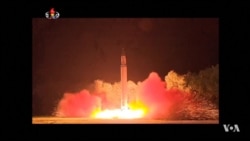ກອງປະຊຸມສຸດຍອດ ລະຫວ່າງ ສະຫະລັດແລະເກົາຫຼີເໜືອ ທີ່ຖືກສະເໜີຈັດຂຶ້ນນັ້ນ,
ສຳລັບຕອນນີ້ແລ້ວ, ມັນກໍຍັງເປັນພຽງຂໍ້ສະເໜີ ຢູ່. ໃນລາຍການສຳພາດ “Plugged
in ກັບນາງ ເກຣຕ້າ ແວນ ຊັສເຕີເຣັນ (Greta Van Susteren)” ຂອງວີໂອເອ ໃນ
ສັບປະດານີ້, ບັນດານັກວິເຄາະເວົ້າວ່າ ໃນຂະນະທີ່ການວາງແຜນງານແລະຈັງຫວະ
ເວລາຂອງການເຈລະຈາ ແມ່ນຍັງບໍ່ທັນແນ່ນອນເທື່ອນັ້ນ, ຄວາມກະ ຈ່າງແຈ້ງຂອງ
ຄວາມກ້າວໜ້າອັນແທ້ຈິງ ສຳລັບທຸກຝ່າຍທີ່ເຂົ້າຮ່ວມກໍຍັງບໍ່ແນ່ນອນເຊັ່ນກັນ. ນັກ
ຂ່າວວີໂອເອ ໂຣເບີດ ຣາຟາແອລ “Robert Rafaelle” ມີລາຍງານເພີ່ມເຕີມ, ເຊິ່ງ
ພຸດທະສອນ ຈະນຳລາຍລະອຽດມາສະເໜີທ່ານ ໃນອັນດັບຕໍ່ໄປ.
ຄວາມພະຍາຍາມຂອງສາກົນ ເພື່ອເຮັດໃຫ້ ເກົາຫຼີເໜືອ ເຂົ້າຮ່ວມໃນໂຕະເຈລະຈາ
ກ່ຽວກັບ ໂຄງການນິວເຄລຍ ແລະ ໄພຂົ່ມຂູ່ທີ່ເຂົາເຈົ້າໄດ້ກໍ່ໃນແຫຼມ ເກົາຫຼີ ແລະ ໄກ
ອອກໄປກວ່ານັ້ນ, ແມ່ນມີຄວາມເຄັ່ງຕຶງຂຶ້ນກວ່າເກົ່າ ໃນສອງສາມສັບປະດາທີ່ຜ່ານ
ມາ.
ລຸນຫຼັງທີ່ທຳນຽບຂາວ ໄດ້ປະກາດວ່າ ປະທານາທິບໍດີ ດໍໂນລ ທຣຳ ຈະພົບປະກັບຜູ້
ນຳ ເກົາຫຼີເໜືອ ທ່ານ ກິມ ຈົງ ອຶນ ນັ້ນ, ເກົາຫຼີເໜືອ ແມ່ນບໍ່ໄດ້ຮັບຮູ້ຢ່າງເປັນທາງ
ການ ກ່ຽວກັບ ການພົບປະດັ່ງກ່າວນັ້ນ.
ໃນໄລຍະຫຼາຍວັນທີ່ຜ່ານມາ ບັນດາຕົວແທນຈາກ ສະຫະລັດ, ຍີ່ປຸ່ນ, ເກົາຫຼີໃຕ້ ແລະ
ເກົາຫຼີເໜືອ ໄດ້ເຈລະຈາກັນ ໃນປະເທດ ຟິນແລນ, ສວີເດັນ ແລະ ນະຄອນ ແຊນ
ແຟຣນຊິສໂກ ຂອງ ສະຫະລັດ ເພື່ອສ້າງແຜນງານສຳລັບການເຈລະຈາດັ່ງກ່າວ.
ທ່ານ ກິລເບີດ ຣອສແມັນ “Gildbert Rozman” ຈາກສະຖາບັນຄົ້ນ ຄວ້ານະໂຍບາຍ
ການຕ່າງປະເທດກ່າວວ່າ ທ່ານ ກິມ ຈົງ ອຶນ ມີເປົ້າໝາຍທີ່ຊັດເຈນໃນຄວາມຄິດຂອງ
ລາວ.
ທ່ານ ກິລເບີດ ຣອສແມັນ ກ່າວວ່າ “ລາວຢາກໄດ້ການຮັບຮູ້ວ່າ ເກົາຫຼີເໜືອ ເປັນດັ່ງ
ກັບປະເພດຂອງລັດທີ່ເທົ່າທຽມກັນ. ແລະເພື່ອທີ່ຈະເຮັດໃຫ້ເປັນແນວນັ້ນ ລາວຕ້ອງ
ຮັກສາອາວຸດນິວເຄລຍຂອງລາວໄວ້, ຫຼື ມີສາຍພົວທີ່ໜ້າມະຫັດສະຈັນບາງຢ່າງ ເຊິ່ງ
ທົ່ວພາກພື້ນຮັບຮູ້ວ່າ ເກົາຫຼີເໜືອ ເປັນມະຫາອຳນາດທີ່ແຂງແກ່ນ, ເຊິ່ງຈະໄດ້ຮັບ
ການຕອບແທນຢ່າງຫຼວງຫຼາຍ. ສະນັ້ນລາວຈຶ່ງຢາກຈະປັບອະນາຄົດຂອງແຫຼມ ເກົາ
ຫຼີ ແລະ ຄວາມດຸ່ນດ່ຽງຂອງອຳນາດທີ່ຖືກຕ້ອງໃນເອເຊຕາເວັນອອກສຽງເໜືອ ເພື່ອ
ຮັກສາລະບອບການປົກຄອງຂອງລາວໄວ້ ແລະ ເຮັດໃຫ້ລາວມີອິດທິພົນ.”
ນັກຂ່າວວີໂອເອພະແນກພາສາເກົາຫຼີ ນາງ ຄອນນີ ຄິມ “Connie Kim” ກ່າວວ່າ
ມາດຕະການລົງໂທດຂອງອົງການສະຫະປະຊາຊາດ ໄດ້ບັງຄັບໃຫ້ ທ່ານ ກິມ ຈົງ
ອຶນ ພິຈາລະນາການເຈລະຈາ, ເຊິ່ງມີຜົນມາຈາກຖະແຫຼງການຫຼ້າສຸດຂອງທ່ານ ກິມ
ທີ່ວ່າທ່ານ “ມີຄວາມຍິນດີທີ່ຈະເຈລະຈາ” ກັບລັດຖະບານ ໂຊລ.
ນາງ ຄອນນີ ຄິມ ກ່າວວ່າ “ລາວໄດ້ສະເໜີການໄກ່ເກຍສັນຕິພາບຕໍ່ ເກົາຫຼີໃຕ້, ແຕ່
ໃນເວລາດຽວກັນ ລາວກໍໄດ້ຂົ່ມຂູ່ ສະຫະລັດ ວ່າປຸ່ມລະເບີດນິວເຄລຍຂອງລາວ
ແມ່ນຍັງມີໄວ້ໃຫ້ພິຈາລະນາຢູ່, ເຊິ່ງລາວຄົງຢາກຈະສ້າງຄວາມແຕກແຍກລະຫວ່າງ
ພັນທະມິດສອງປະເທດນັ້ນ ແລະ ໄດ້ຮັບການຫຼຸດຜ່ອນຕໍ່ມາດຕະການລົງໂທດ.”
ທ່ານ ຈອນ ເລັນໂຈສກີ ແມ່ນປະທານຂອງສະຖາບັນການເມືອງໂລກ. ທ່ານກ່າວວ່າ
ສະຫະລັດ ຄວນພະຍາຍາທີ່ຈະປ່ຽນແນວຄິດປະຊາຊົນຂອງທ່ານ ກິມ ທີ່ເຂົາເຈົ້າໄດ້
ຍິນມາຫຼາຍທົດສະວັດແລ້ວ.
ທ່ານ ຈອນ ເລັນໂຈສກີ ກ່າວວ່າ “ຂ້າພະເຈົ້າຄິດວ່າ ພວກເຮົາຕ້ອງເລີ່ມຄິດບໍ່ພຽງແຕ່
ກ່ຽວກັບ ການສ້າງສາຍພົວພັນກັບລັດຖະບານ ເກົາຫຼີເໜືອ ເທົ່ານັ້ນ. ພວກເຮົາຕ້ອງ
ຄິດ ກ່ຽວກັບ ການສ້າງສາຍພົວພັນກັບປະຊາຊົນ ເກົາຫຼີເໜືອ. ນີ້ແມ່ນການທູດສາ
ທາລະນະ ແລະ ນັ້ນກໍໝາຍຄວາມເຖິງການເຊື່ອມຕໍ່ກັບເຂົາເຈົ້າ, ມັນໝາຍຄວາມວ່າ
ໃຫ້ເຂົາເຈົ້າຮູ້ວ່າພວກເຮົາເປັນຫ່ວງ ກ່ຽວກັບ ເລື່ອງສິດທິມະນຸດຂອງເຂົາເຈົ້າ, ວ່າ
ພວກເຮົາບໍ່ແມ່ນຜີມານ ຄືລະບອບການປົກຄອງນັ້ນໄດ້ເຮັດໃຫ້ເຮົາເປັນ.”
ທ່ານ ກິລເບີດ ຣອສແມັນ ກ່າວວ່າ ບໍ່ວ່າການເຈລະຈາຈະກາຍເປັນຈິງຫຼືບໍ່ນັ້ນ,
ຄວາມຄາດຫວັງຕ່າງໆ ແມ່ນບໍ່ຄວນຖືກເວົ້າອອກມາ.
ທ່ານ ກິລເບີດ ຣອສແມັນ ກ່າວວ່າ “ຄົນຜູ້ທີ່ມີຄວາມຫວັງວ່າ ການພົບປະຄັ້ງນີ້ຈະໃຫ້
ຄຳຕອບທີ່ແທ້ຈິງນັ້ນ, ຂ້າພະເຈົ້າຄິດວ່າ ມັນເປັນຄວາມຄິດໃນແງ່ບວກຫຼາຍໂພດ.
ສິ່ງທີ່ພວກເຮົາສາມາດຄາດຫວັງໄດ້ແທ້ໆກໍ ແມ່ນພວກເຮົາເລີ່ມຂະບວນການຂອງ
ການເຈລະຈາທີ່ ເກົາຫຼີເໜືອ ໄດ້ສັນຍາ ກ່ຽວກັບ ບາງຢ່າງ ແລະ ໄດ້ສັນຍາທີ່ຈະດຳ
ເນີນໄປໜ້າ ແລະ ແລ້ວປະເທດອື່ນໆຄື ຈີນ, ຣັດເຊຍ, ຍີ່ປຸ່ນ, ເກົາຫຼີໃຕ້ ຈຶ່ງເຂົ້າຮ່ວມ
ເພື່ອພະຍາຍາມປັບປຸງຂະບວນການນີ້, ແລະ ເກົາຫຼີເໜືອ ກໍຈະພະຍາຍາມເລືອກ
ຄວາມແຕກຕ່າງ, ໂດຍເພັ່ງເລັງໃສ່ສິ່ງທີ່ແຕ່ລະປະເທດຕ້ອງການ, ເພື່ອຄວາມໄດ້ປຽບ.
ມັນອາດຟັງຄືພວກເຮົາໃກ້ຈະປົດອາວຸດນິວເຄລຍໄດ້, ແຕ່ພວກເຮົາຍັງຫ່າງໄກຈາກ
ມັນຫຼາຍ.”
ໃນສັບປະດາທີ່ຜ່ານມາ, ທີ່ປຶກສາດ້ານຄວາມປອດໄພແຫ່ງຊາດ ສະຫະລັດ ທ່ານ
H.R ແມັກມາສເຕີ ໄດ້ກ່າວວ່າ ວໍຊິງຕັນ ມີ “ຄວາມມຸ່ງໝັ້ນ” ທີ່ຈະດຳເນີນນະໂຍາຍ
ກ່ຽວກັບ ການສ້າງຄວາມກົດດັນສູງສຸດຕໍ່ ເກົາຫຼີເໜືອ ເພື່ອປົດອາວຸດນິວເຄລຍນັ້ນ.
A proposed U.S.-North Korea summit is, for now, just that: a proposal. On this week's edition of VOA's "Plugged In With Greta Van Susteren," analysts say while the logistics and timing of talks are up in the air, so is the definition of real progress for all sides involved. VOA's Robert Raffaele has more.
International efforts to get North Korea to come to the table about its nuclear program, and the threat it poses to the Korean peninsula and beyond, have intensified in recent weeks.
Following a White House announcement that President Donald Trump would meet with North Korean leader Kim Jong Un, North Korea has not formally acknowledged any such meeting.
Over the past several days representatives from the United States, Japan, South Korea and North Korea have been talking in Finland, Sweden and San Francisco to formalize an agenda for talks.
Gilbert Rozman with the Foreign Policy Research Institute says Kim Jong Un has one very clear goal in mind.
"He wants recognition of North Korea as a kind of an equal state. And to have that he has to keep his nuclear weapons, or to have some amazing relationship where the whole region recognizes North Korea as a strong power, which will be heavily rewarded. So he wants to shape the future of the Korean Peninsula and get the right balance of power in Northeast Asia to preserve his regime and give him clout."
VOA Korean Service reporter Connie Kim says U.N. sanctions have forced Kim Jong Unto consider talks, resulting in Kim's recent statement that he was "open to dialogue" with Seoul.
"He's extending an olive branch to South Korea, but at the same time he's threatening the U.S. that he has a nuclear button on his desk, which he's probably wanting to make that rift between the two allies and get an ease (sic) of sanctions."
John Lenczowski is president of the Institute of World Politics. He says the United States should attempt to change the narrative Kim's citizens have heard for decades.
"I think that we need to start thinking not simply about relations with the North Korean government. We have to think about relations with the North Korean people. This is public diplomacy and that means connecting with them, it means letting them know that we care about their human rights, that we are not the monsters that the regime makes us out to be."
Gilbert Rozman says regardless of whether the talks become reality, expectations should be muted.
"People who are getting their hopes up that this meeting is going to provide a real answer, I think are too optimistic. What we really can expect is that we begin a process of negotiations where North Korea promises something and pledges to go forward, and then all of the other countries — China, Russia, Japan, South Korea — enter into the fray trying to shape this process, and North Korea tries to play on the differences, (focusing on) what each country wants, to get an advantage. It may sound like we're getting to denuclearization, but we're so far off "
Last week, the U.S. national security adviser ((H.R. McMaster)) said Washington is "determined" to keep up its policy of maximum pressure on North Korea to denuclearize.





